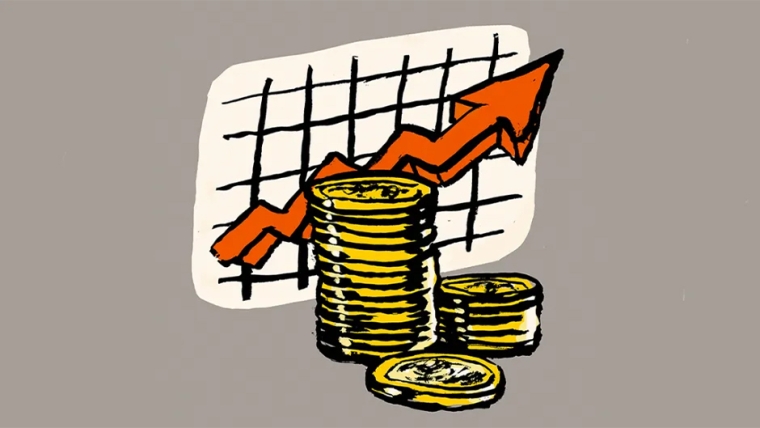
Anxiety about inflation, among citizens and politicians alike, has been peaking recently. In the United States, the year-on-year increase in consumer prices reached 7.5% in January, the highest rate since February 1982. If people’s incomes increase by less than the rate of inflation, their real incomes decline, and they cannot afford to buy as much stuff as before. This is the “income effect” of inflation.
But, as I show in a recent research paper, there is an upside to inflation. In recent decades, in fact, inflation has been a great boon to middle-class US households’ balance sheets, and has therefore helped to mitigate the increase in overall wealth inequality.
This is the “wealth effect” of inflation, and it works in the following way. Suppose you have $100 in assets and $20 in debt, so that your net worth is $80. Suppose, too, that inflation is 5% per year and the nominal value of your assets increases at the same rate (the prices of assets such as homes tend to move in line with inflation). Then, in real terms, the value of your assets remains unchanged, but your debt is now 5% lower. So, the real value of your net worth rises to $81, an increase of 1.25%.
Moreover, the higher the ratio of debt to assets, the greater the percentage increase in net worth as a result of inflation. This is the “leverage effect”: If your debt in the previous example was $40, rather than $20, then your net worth would increase by 3.3%.
In the US, the middle class – defined as the median household – is much more indebted than the very rich (the top 1%). In 2019, the ratio of total household debt to total assets for the middle class was 36.5%, compared to a ratio of just 2.3% for the very rich. In terms of net worth, therefore, the middle class will benefit much more from inflation than the rich.
Likewise, Black and Hispanic households in the US are far more indebted than white households, with a debt-to-asset ratio almost three times higher. In wealth terms, at least, these two groups will benefit much more from inflation than white Americans.
One hallmark of US monetary policy since the early 1980s has been a moderation in inflation, which averaged 2.5% per year from 1983 to 2019 (the period I studied). Coincident with this trend has been a surge in US wealth inequality. To measure this, I used the ratio of the wealth of the top 1% of the wealth distribution to median wealth (that is, the wealth of the average household). From 1983 to 2019, this ratio more than doubled from an already high 131.4 to an even more staggering 273.8.
Yet, although wealth inequality soared during this period, inflation was actually a mitigating factor because it helped the middle class much more than the super-rich. Had inflation been zero, the wealth-inequality ratio would have risen even higher, to 385. Instead, the debt devaluation resulting from inflation led to a 76% increase in US median wealth over the 36-year period.
Inflation also helped to lower (or at least limit the increase in) racial and ethnic wealth gaps. For example, the actual ratio of mean wealth between Black and white households dropped sharply from 0.19 in 1983 to 0.14 in 2019. But with zero inflation, the ratio would have fallen to just 0.06.
The story is similar regarding the ratio of mean net worth between Latinx and white households. From 1983 to 2019, the actual ratio increased from 0.16 to 0.19. With zero inflation, it would have decreased to 0.14.
What are the policy implications of these findings? In particular, should the US Federal Reserve still try to dampen inflation, or should it take a more relaxed stance? One way to decide is to compare the income effect of inflation (which is negative) with the wealth effect (which is positive). If the income effect is greater, then inflation should be quashed. But if the wealth effect is greater, then some inflation should be encouraged.
Over the period between 1983-2019, inflation cost the average US household less than $50,000 in income but bolstered median wealth by more than $60,000. The wealth effect thus outweighed the income effect. In contrast, inflation reduced the real income of the very rich by about $600,000, while boosting their wealth by less than $500,000.
In net terms, inflation has benefited the middle class and adversely affected the very rich. It has also helped to limit both overall wealth inequality and racial and ethnic wealth gaps. Those who worry about the recent uptick in inflation – beginning with the Fed – should bear this in mind when considering whether and by how much to tamp it down.
Edward N. Wolff is Professor of Economics at New York University and the author of A Century of Wealth in America (Harvard University Press, 2017). Copyright: Project Syndicate, 2022, published here with permission.
6 Comments
Good to read something other than the binary, high inflation = bad, low inflation = good. Depending on the rate of inflation and how long it persists, it’s possible the ‘wealth effect’ might help those that are finding they bought their first house at the top of the market. As long as they can hold on of course, you never benefit if forced to sell. And CPI is lagging significantly behind house inflation which has peaked, so there will be a painful period for many.
This totally ignores the cost of living effects of inflation and solely concentrates on inflationary effects on debt . To that extent the research is not credible on its overall impact .
This requires that incomes keep up with inflation, which is not a given.
A completely worthless analysis, which assumes that wages keep up with inflation and that ignores the open and hidden effects on cost of living.
Moreover, high inflation induces many other negative side effects such as the deflating effect on many assets in an environment where interest rates have to keep up with inflation. Other aspects such as lack of trust in the currency and resulting behaviors and long term negative effects are not listed either. Getting new finance to invest in businesses is also problematic in a high inflation environment, and an inflation environment is also conducive to high level of conflict between employees and employers, due to an ongoing need to keep up with the spiral of wage increases, cost increase, price increases.
Whoever had to live through the period of high inflation in the 70's and early 80's knows that it was no fun. Minimizing or hiding the level of structural damage created by inflation is highly irresponsible and deeply uninformed.
"In net terms, inflation has benefited the middle class and adversely affected the very rich"
Over here in NZ, only those who have the money (or credit), are able to buy houses, a class of assets that appreciated in value by some 50%, over 2.5 years.
Most old timers that I know, who survived being in debt during the early 80s and managed to keep their assets, ended up doing very well. It was not the time to be sitting on a heap of savings.

We welcome your comments below. If you are not already registered, please register to comment
Remember we welcome robust, respectful and insightful debate. We don't welcome abusive or defamatory comments and will de-register those repeatedly making such comments. Our current comment policy is here.